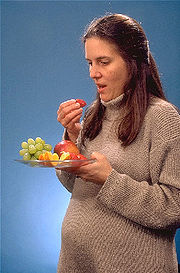Around the world, over recent decades, there has been a dramatic increase in obesity and associated diseases such as Type 2 diabetes and non-alcoholic fatty liver disease (NAFLD). One factor that has been suggested to contribute to NAFLD in children is obesity in the mother during pregnancy. However, a new research paper published this week has found that offspring of both lean and obese non-human primate mothers who chronically consumed a high-fat diet had an increased risk of developing NAFLD.
It is known that metabolic events during pregnancy can affect offspring, for example, women with gestational diabetes tend to have larger babies that are at higher risk of developing metabolic diseases later in life. More recently, it has been suggested that maternal weight and triglyceride levels may be a better predictor of excessive fetal growth.
This latest research showed that only a portion of the adult female monkeys studied, who were chronically consuming a high-fat diet, became obese and insulin resistant. However, all fetal offspring of high-fat diet mothers showed signs of NAFLD. Importantly, switching the mothers to a low-fat diet during a subsequent pregnancy reduced many of the abnormalities in the fetal liver, even though some of the mothers remained obese and insulin resistant. These findings strongly suggest that exposure to excess fat intakes in pregnancy may increase the risk of NAFLD and metabolic diseases during post-natal life.
Much is known about the importance of many nutrients during pregnancy – for example folic acid reduces the risk of neural tube defects, and iron requirements increase dramatically during pregnancy to meet the needs of the growing fetus as well as the increased needs of the mother, with her expanding blood volume. This new research suggests we may also need to consider our fat intake when ‘expecting’!
Pregnancy is probably the most important time in our lives to really focus on having a healthy diet to ensure the optimal development and well being of our babies, and to ensure our own health and well being. It’s important to have a balanced diet, with wholegrain cereals, fruits and vegetables, iron-containing foods (such as meat, seafood, nuts and legumes) and dairy foods. Ensuring an adequate iodine and folic acid intake is also important. In addition, foods with minimal fat and foods with a low-sugar content should be selected. Alcohol should be avoided completely. For more information on healthy eating during pregnancy see the New Zealand Dietetic Association fact sheet Nutrition for a Healthy Pregnancy.
Reference: McCurdy CE, Bishop JM, Williams SM, et al. Maternal high fat diet triggers lipotoxicity in the fetal livers of nonhuman primates. The Journal of Clinical Investigation. Doi:10.1172/JCI32661.
To access this paper, log in to the resource section of our website.